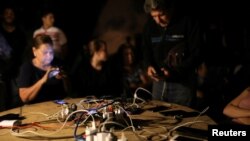Latin American lender CAF and the United Nations are seeking to provide financing to the government of Venezuelan President Nicolas Maduro to improve electricity supply in the crisis-stricken nation that is suffering from chronic blackouts, the two institutions told Reuters.
Lawmakers in Venezuela's congress have proposed a financing mechanism under which CAF would provide $350 million to make improvements to the ailing power sector, with the U.N. Development Program carrying out the investments.
But the proposal has created a deep divide within the country's opposition between those who say the proposal will provide humanitarian assistance and those who oppose it because it will provide new funding for Maduro's government, which is widely accused of corruption and mismanagement.
"The project is a CAF loan to the Bolivarian Republic of Venezuela which is requested by the Ministry of Finance and has to be approved by the National Assembly," a U.N. official wrote in an emailed response to questions from Reuters.
CAF in an emailed response to questions confirmed that the loan would go to Venezuela's government.
System of controls
No funds would be transferred to state electrical authorities, the U.N. official said, and the financing mechanism would have a system of checks and balances "to ensure that the resources are only used for this purpose."
Though the amount would be relatively small, its approval could pave the way for Maduro to receive additional international financing down the road. That could eventually undercut the effects of U.S. sanctions, which block American citizens from lending money to Maduro as part of an effort to push him from power.
Draft legislation for the proposal does not describe the financial conditions of the loan, which are usually provided to the legislature before such financing is approved.
Venezuela's information ministry, which fields questions on behalf of the finance ministry, did not respond to an email seeking comment.
Chronic blackouts around the country have undermined the functioning of everything from routine commerce to hospital emergency rooms. Especially hard hit has been the western state of Zulia, where citizens routinely go 12 hours without power.
"Zulia, #withoutpower and distressed, is demanding solutions," wrote opposition politician Manuel Rosales on Twitter. "It hasn't been days or months but years of electrical chaos that have disrupted the lives of the people of Zulia."
Electricity sector expert Miguel Lara warned that legislators who voted for the project would be adding to the country's debt burden by providing funds to the government. "It does not make technical or economic sense," he wrote on Twitter. "All resources given to [state power company] Corpoelec are lost. They are the crisis."
The legislature on Tuesday postponed discussion of the proposal until next week in order to seek out more support among lawmakers. Opposition legislators opposed to the measure declined to comment, saying they prefer to wait for it to come up for a vote.
Complaints of corruption
Critics have for years denounced widespread corruption in the ruling Socialist Party's management of the power sector.
Those complaints focused on a 2010 declaration of an "electrical emergency" that led to the disbursement of billions of dollars in no-bid contracts for generation projects that were never completed. Critics call it one of the largest embezzlement schemes in the country's history.
Maduro's government denies misuse of funds and blames power problems on sabotage by the opposition.
It was not immediately evident if or how U.S. sanctions would apply to the proposal in question.
The U.S. Treasury did not immediately respond to an email seeking comment.






